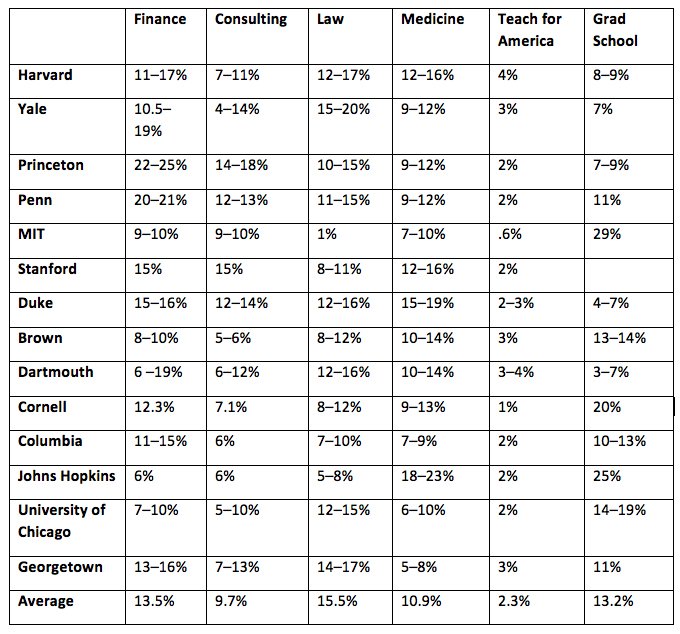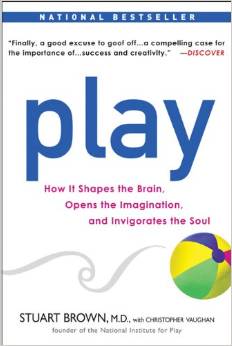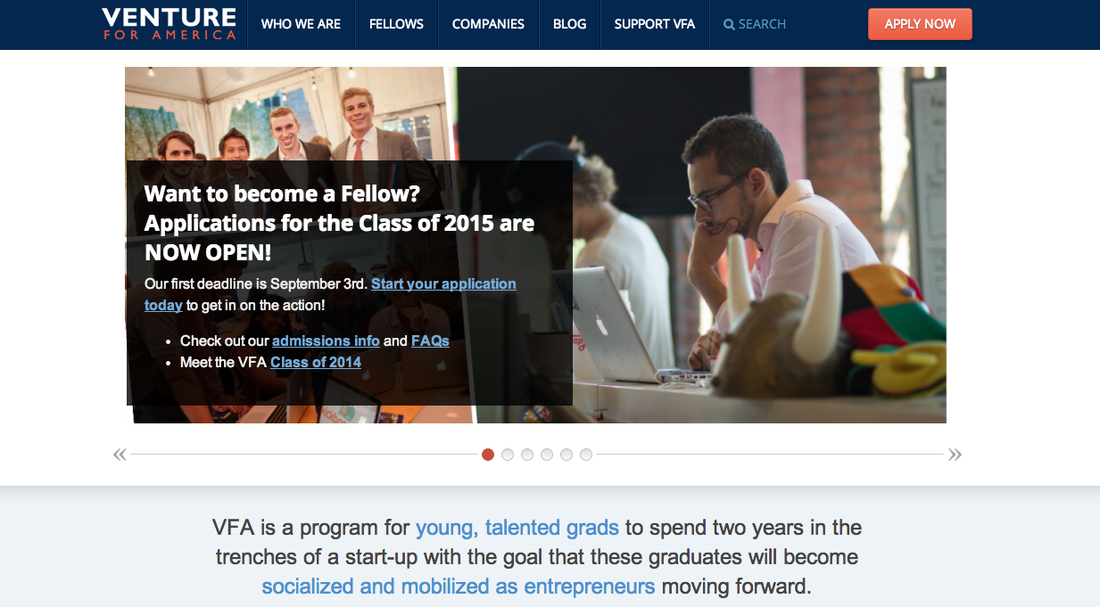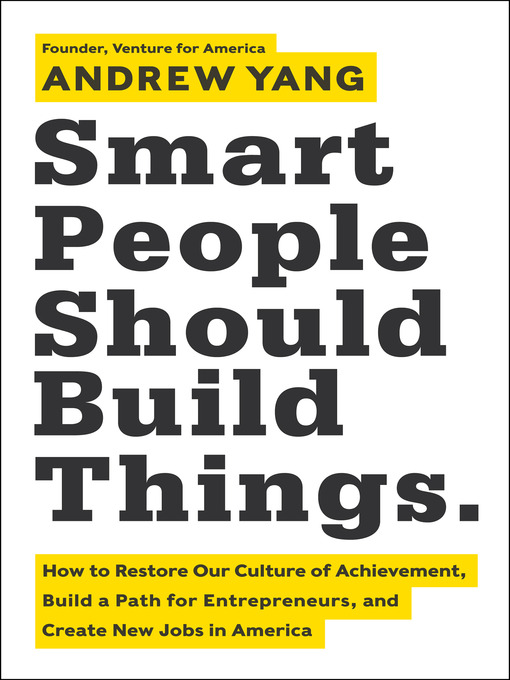Half of America's top graduates do the same six jobs after graduation. The reason why is depressing.8/4/2014
There's a perceived formula to "success" in today's world. We've all heard it:
You work hard in middle school so you can get into a good high school. Then you work hard in high school to get the grades, leadership roles and volunteer hours required to get into a good college -- often with the help of private tutors and coaches. Then you go to college so you can take the right classes and do the right extracurriculars to get a "good job" that pays well. It absolutely takes intelligence and hard work to shine in this environment. But at the end of the day, our nation's best and brightest have spent their first 22 years following instructions and jumping through hoops. Which is probably why teenagers and young adults are more anxious and depressed than ever. And also why the majority -- literally, the majority -- of graduates from America's top schools do one of six things: finance, consulting, law, medicine, Teach for America or grad school.
Each of these six choices is safe, yet prestigious. And getting there isn't all that different from getting into college. You talk to a representative from the institution when he visits your school. You attend info sessions and interviews. You take a standardized test. There is an application form, an application season, and an application deadline.
Which begs the question: do all these talented young people really fit so neatly into one of six boxes? Or are they simply doing what they've always done, because that is all they know? According to Andrew Yang, author of Smart People Should Build Things: How to Restore Our Culture of Achievement, Build a Path for Entrepreneurs, and Create New Jobs in America, it's probably the latter. Think about it. These are kids who have always done the right thing -- right down to the letter. Nowhere in their over-scheduled childhood or their high-achieving adulthood have they had to explore, discover and reflect. Maybe they've never even taken a risk. Never failed. Because that isn't something we explicitly value in the modern school system. Instead, we reward work, grades and obedience. We encourage them all to follow a very narrow path -- one without much of a view. Yang has interviewed doctors, lawyers and investment bankers everywhere... and typically discovered below-average job satisfaction. Many professionals expressed a lack of connection or meaning in their work. They said they would like to "do something entrepreneurial" or find "something I'm really excited about." Sometimes they make the jump. Other times, they stay the course... and wonder why they don't like their job more. Meanwhile, there are hundreds of startups that want to grow. With the right team, they could improve lives all over the world -- both by providing a valuable product/service, and through direct and indirect job creation. But they don't have the budget or prestige to attract the talent they need to make it happen. Startups do what they can -- but to some degree, job applicants have to seek them out. Which is a problem: risk-taking and exploration aren't traits we've fostered in our gifted youth. Too often, the idea of branching out hasn't even occurred to them. Or maybe they don't see it as "good enough." Maybe they've heard too many messages about what smart people should do. *** I won't lie -- I attended my share of info sessions my senior year at Stanford. I also applied for a master's program in psychology, which is what I ended up doing. And I'm glad! I did my research on adult play behavior, and found evidence that playfulness is a skill that a lot of people today lack -- due partly to high-achieving childhoods and overuse of technology. This is bad news. Leisure boredom leads to anxiety, depression, loneliness and other issues. Colleges everywhere are struggling to keep up with surging mental health needs on campus. (It's also bad news professionally. Research shows that children who played -- and especially tinkered -- growing up are better problem solvers as adults. Which is why I think all parents, children and humans should read Stuart Brown's Play: How it Shapes the Brain, Opens the Imagination and Invigorates the Soul.) I cared deeply about my research findings, and wanted to help solve the problem. That's how I ended up at startup called Trubates. It was like Groupon + Amazon -- a "marketplace for deals," rather than a "daily deal site." I thought selling meals, classes and adventures at a steep discount would help people discover new passions and try new things. Trubates was a small company, so I had a ton of responsibility. By the end of my first month, I personally controlled a $9,000 daily advertising budget. I felt autonomous and responsible. I didn't want to meet my goals. I wanted to crush them. I made my own hours -- if I didn't show up till 11am, that was fine. As long as I got the work done. The office atmosphere was collaborative, informal and fun. And we were growing! At one point, we had new hires every week. Sadly, in spite of impressive growth, we didn't get our next round of funding. The space was too competitive. My budget was cut... and eventually, Trubates died. But for nine months, I had a really cool professional experience. I even got some severance, which kept me afloat until I started something new.
Maybe that's not the kind of job security young people want. It did suck to be looking for a job so soon after wrapping up my previous search. But it wasn't that terrible. I survived. And, well... it was a gamble. I took a chance. Some of the other startups I'd looked at (this was back in 2010) include Marketo, Wildfire, and IMVU. Marketo's revenue was $95.9 million in 2013. Wildfire was acquired by Google for $350 million in 2012 -- with $100 million in earn-outs and retention bonuses for employees. And IMVU now has over 3 million users and 120 employees. So in a different universe, things went very differently for me.
And in this universe, things went very differently for someone like me. *** I'm lucky that I went to Stanford. I lived in the heart of the Silicon Valley, and was surrounded by examples of people who forged their own path and came out happy, healthy and wealthy. Thousands of companies were founded right off campus, so they were able to send recruiters to my door. What if you live somewhere else? Startups are startups. Unlike consulting and finance firms, they don't have $50,000 to spend on each of their recruits. They're lean. They're overworked. So how do you find opportunities with them? Since I like to complement idea-sharing with actionable suggestions, I'm going recommend the following:
4. Download Jobr or Blonk -- two apps that are like LinkedIn meets Tinder. Recruiters and CEOs post job openings at their companies. You swipe yes if you're interested and no if you're not. If there's mutual interest, you can start a chat. This is great for anyone who feels overwhelmed when looking at page after page of job ads.
5. Read Smart People Should Build Things: How to Restore Our Culture of Achievement, Build a Path for Entrepreneurs, and Create New Jobs in America. It's spectacular, and pretty much every grown-up I know who's read it wishes they'd read it sooner. It will do a lot more than I can to expand your thinking about the future.
Finding a startup job is a lot easier if you have a technical background -- but there are still plenty of opportunities for social science and humanities scholars. Or, if you want to make the jump and learn to program, there are more ways to do that than ever -- just check out AppAcademy, Treehouse, CodeAcademy, MIT Open Courseware, or Coursera.
You don't have to limit yourself to one of six options. Think big. Take a chance!
4 Comments
11/11/2015 11:20:08 pm
When you inspire students to follow a real small path -- after you let them have a real limited explanation regarding "success" -- it generally won't actually eventually these people that we now have possibilities around outside of medication, legislation, financial, talking to and also legislation classes.
Reply
Cara Gammill
12/2/2015 11:45:58 am
Reply
4/28/2016 04:34:59 am
Startups accomplish what they are able to other than to a little degree, job applicants include to look for them out. Which is a difficulty: adventuresome plus exploration isn’t character we have fostered in our talented childhood.
Reply
Yvan
5/10/2023 09:00:41 am
I wonder how would the chart of career outcomes look like if a seventh column was added: tech. Because since the data in that chart was compiled, which is a little dated, tech took an ever-increasing chunk of the graduate pool at elite universities (and certainly Stanford and MIT)
Reply
Leave a Reply. |
About the Author

Eva is a content specialist with a passion for play, travel... and a little bit of girl power. Read more >
Want to support The Happy Talent? CLICK HERE!
Or Find me on Patreon!
What's Popular on The Happy Talent:
Trending in Dating and Relationships:
What's Popular in Science: Playfulness and Leisure Skills:
Popular in Psychology and Social Skills:
Categories
All
|































 RSS Feed
RSS Feed